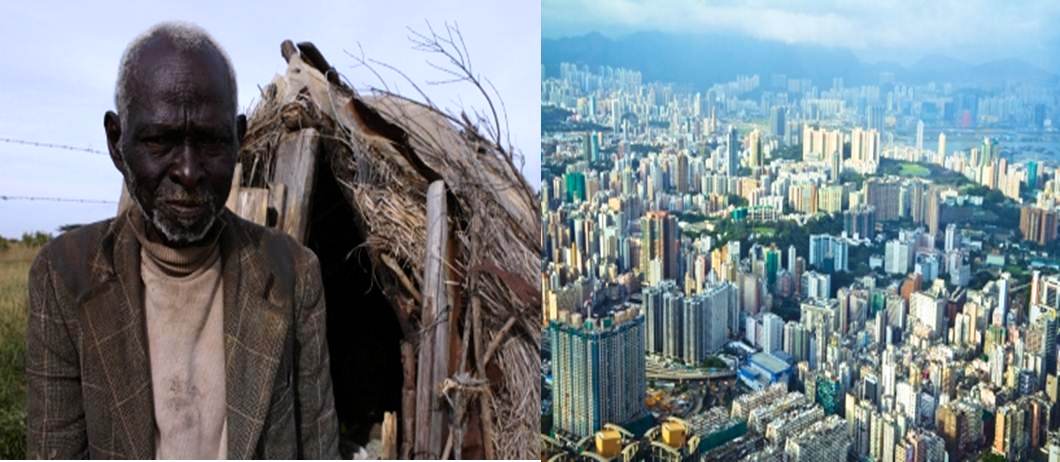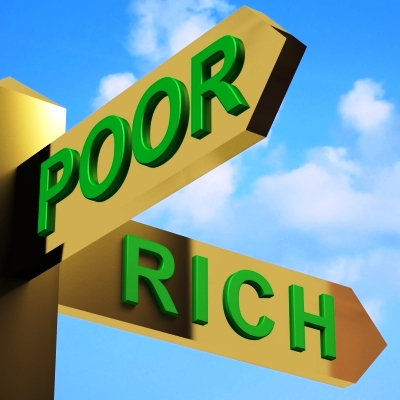 Income Inequality in the US, persisting for decades now and reaching a shameful gap in favor of the rich, has evolved into a serious threat to the American Dream. The Obama administration has already acknowledged that the widening income inequality between the wealthiest and the bottom income earners is one of the biggest challenges the country is facing today. Getting the public informed of this pressing problem is one of the first crucial steps to formulating and enforcing needed reforms. Here is a comprehensive list of the most relevant and updated information, news, data and resources that will be useful for the concerned American in understanding the issue, and every reader in the world who believes that equality does matter.
Income Inequality in the US, persisting for decades now and reaching a shameful gap in favor of the rich, has evolved into a serious threat to the American Dream. The Obama administration has already acknowledged that the widening income inequality between the wealthiest and the bottom income earners is one of the biggest challenges the country is facing today. Getting the public informed of this pressing problem is one of the first crucial steps to formulating and enforcing needed reforms. Here is a comprehensive list of the most relevant and updated information, news, data and resources that will be useful for the concerned American in understanding the issue, and every reader in the world who believes that equality does matter.
ARTICLES
D.C. Politicians Fail to Face Up to U.S. Income Inequality
By David Horsey (March 2013)
http://articles.latimes.com/2013/mar/13/nation/la-na-tt-income-inequality-20130312
Income Inequality is an all-American crisis bigger than the deficit or the war on terrorism, but no one seems ready to take it on. The political spat never seems to honestly address the gaping and growing class divide in the United States. As politicians in Washington slam one another over competing budget priorities, most avoid facing the disturbing question behind all the numbers.
Shocking New Statistics on US Income Inequality
By Brett Wilkins (March 2013)
http://digitaljournal.com/article/346567
Analysis of Internal Revenue Service data has revealed shocking disparities in income growth among American workers over the past six decades, largely attributable to the reduction of federal tax burdens for the wealthiest Americans. It should come as no surprise that 1 out of every 6 Americans is living in poverty, with poverty rates as high as 27.6 percent for blacks and 31.2 percent among families with a female head of the household.
U.S. Income Inequality Worse Than Many Latin American Countries
By Huffington Post report (Jan 2013)
http://www.huffingtonpost.com/2013/01/27/us-income-inequality-wors_n_2561123.html
Income inequality is on the rise in the United States, exceeding the rate of Latin America, long viewed as region with the worst wealth inequality in the world. It cited the latest income report by the UN Economic Commission for Latin America and the Caribbean: Wealthiest 20 percent earn 16 times more than the poorest 20 percent.
Op-Ed: The fallacy of America’s racial wealth gap
By Alexander Baron (March 2013)
http://digitaljournal.com/article/346319
The money of the wealthiest people is staggering, but that is not the whole story. A root and branch reform of the oppressive financial system is needed, in particular banking. Taking the power to create credit away from the banks must be the first step. We must also look to alternative methods of distributing purchasing power from wages, salaries, and dividends.
Obama’s Uphill Battle Against Income Inequality
By Chrystia Freeland (April 2013)
President Obama is addressing the issue he cares about most with a lot of energy, but the problem is still getting worse. The problem is not that the President doesn’t care, or that he isn’t trying hard enough. It is that the issue has become more deeply entrenched and harder to fix over the past 30 years.
Why U.S. Income Inequality Is More Frightening Than Europe’s
By Jordan Weissman (Jan 2013)
U.S. income inequality is in fact exceptional, and not just because of its severity. In many developed countries, a rising tide has truly lifted all boats. In the US, the tide is lifting up the rich, while drowning many of the poor. What’s so frightening about the way the U.S. economy was changing, even before the Great Recession many Americans were seeing the value of their work and their standard of living decline.
The Growing Income Gap in the US Harms the Economy
Jonathan Rauch (Sept 2012)
Inequality is the price America pays for a dynamic, efficient economy. As long as the bottom and the middle are moving up, there is no reason to mind if the top is moving up faster. In a democracy, politicians might create policies allowing banks to write flimsy home mortgages and encouraging consumers to seek them, or a “let them eat credit” strategy.
The Great Divide: Global Income Inequality and Its Cost
Global Post and The Ford Foundation
http://www.globalpost.com/special-reports/global-income-inequality-great-divide-globalpost
SCHOLARLY RESEARCHES and WHITE PAPERS
The Roots of the Widening Racial Wealth Gap: Explaining the Black-White Economic Divide
By Thomas Shapiro, Tatjana Meschede and Sam Osoro published by the Institute on Assets and Social Policy (IASP)
The report provides critical new information about what has fuelled the racial wealth gap and points to policy approaches that will set our country in a more equitable and prosperous direction. Key findings include: tracing the same households over 25 years, the total wealth gap between white and African-American families nearly triples, from $85,000 in 1984 to $236,500 in 2009 and equal achievements, such as income gains, yield unequal wealth rewards for whites and African-Americans.
The U.S. Income Distribution and Mobility: Trends and International Comparisons
By Linda Levine, Specialist in Labor Economics (November 2012)
http://www.fas.org/sgp/crs/misc/R42400.pdf
The report explains the issue of inequality in depth and presents measures of income dispersion. It shows the distribution of income across U.S. households has become comparatively more unequal over time as high-income U.S. households have benefited disproportionately from economic growth, and that is less equal compared with distributions in many other developed countries.
National Longitudinal Mortality Survey – Income Inequality has Effect on Health
http://www.nber.org/reporter/spring03/health.html
The report analyzes long-range data and concludes that richer, better-educated people live longer than poorer, less-educated people and lower mortality and morbidity is associated with almost any positive indicator of socioeconomic status.
MEDIA
John Talton – writer, economic journalist for The Seattle Times and columnist for several news agencies. He blogs the Rogue Columnist which focuses on sustainability, urban issues and politics in the Great Disruption that is our future.
Twitter: @jontalton
Dave Gilson – senior editor at Mother Jones word wrangler, data cruncher, chart drawer, pun maker.
Twitter: @daudig
Robert Lenzner – National Editor of Forbes Magazine. His areas of expertise include Wall Street, investment banking, finance, the oil industry, corporate takeovers, insider trading and litigation.
E-mail: rlenzner@forbes.com
Jonathan Rauch – contributing editor of National Journal and The Atlantic, is the author of several books and many articles on public policy, culture, and economics.
Website: www.JonathanRauch.com
Carolyn Perot – Author, Art Director. covering technology, business, lifestyle, dogs, and politics.
Email: query@motherjones. com
Brett Wilkins – a San Francisco-based author and social justice advocate. He is the editor and publisher of Moral Low Ground and is a Yahoo! Featured Political Contributor. He writes for the Digital Journalist with expertise in politics, travel, food and dining.
Website: www.morallowground.com
Alexander Baron – writes for the Digital Journalist with expertise in unemployment, politics, music, government and the Internet.
Chrystia Freeland – Managing Director and Editor, Consumer News for Thomson Reuters Digital.
Twitter: @cafreeland
Jordan Weissmann – associate editor at The Atlantic. He has written for a number of publications including The Washington Post and The National Law Journal.
Twitter: @JHWeissmann
Bonnie Kavoussi – economics reporter at The Huffington Post. She is a graduate of Harvard University, where she studied history and economics.
E-mail: bonnie.kavoussi@huffingtonpost.com
Twitter : @bkavoussi.
EXPERTS ON THE SUBJECT
David Cay Johnston – Pulitzer Prize for Beat Reporting and a winning tax policy journalist. He reported that between 1966 and 2011, average inflation-adjusted income of the bottom 90 percent of US workers grew by a negligible $59. Meanwhile, income of the top 10 percent of workers soared by $116,071.
Twitter: @DavidCayJ
Adam Isaacson – Analyst, key member of WOLA’s Regional Security Policy team and an expert on defense, civil-military relations and U.S. security assistance to the Americas. He collaborates on Just the Facts, a source of information and analysis of the United States’ relationship with Latin America
www.wola.org/people/adam_isacson
Linda Levine – Department Chair and Professor of Psychology and Social Behavior. Ph.D., at The University of Chicago. Specialist in Labor Economics, author of: The U.S. Income Distribution and Mobility: Trends and International Comparisons (November 2012)
E-mail: llevine@uci.edu
Raghuram Rajan – Finance professor, Booth School of Business, University of Chicago, author of Fault Lines: How Hidden Fractures Still Threaten the World Economy (2010).
E-mail: raghuram.rajan@chicagobooth.edu
Andrew Berg – Assistant Director in the IMF’s Research Department. Previously, he led work on regional studies and missions to Malawi for the IMF’s African Department, and has also worked on a range of research and policy issues.
E-mail: media@imf.org
Emmanuel Saez – A French economist. Saez is Professor of Economics at the University of California, Berkeley. His work, done with Thomas Piketty, includes tracking the incomes of the poor, middle class and rich around the world.
E-mail: saez@econ.berkeley.edu
Thomas Piketty – Economics professor at the Paris School of Economics. He is a French economist who specializes in the study of economic inequality.
E-mail: piketty@ens.fr
Thomas Shapiro – a professor of Sociology and Public Policy at Brandeis University and is the author The Hidden Cost of Being African American and the co-author of Black Wealth/White Wealth.
E-mail: tshapiro@brandeis.edu
Tatjana Meschede – Scientist and Senior Lecturer at The Heller School for Social Policy and Management. Expert in poverty, economic security, research methods and working with large national data sets.
E-mail: meschede@brandeis.edu
DATA SETS and INFOGRAPHICS
It’s the Inequality, Stupid
By Dave Gilson and Carolyn Perot (March 2011)
http://www.motherjones.com/politics/2011/02/income-inequality-in-america-chart-graph
Offers insightful analyses on the distribution of wealth in America, highlighting both the inequality and the difference between our perception of inequality and the actual numbers. Graphs and data visualizations show that the reality is often not what we think it is.
US Income Inequality Has Jumped More Than in Any Other Major western Country Since 1960
By Bonnie Kavoussi (Nov 2012)
http://www.huffingtonpost.com/2012/11/15/income-inequality_n_2138459.html
Shows how the Top Marginal Tax Rate (Top MTR) of the top one percent’s share of total income has risen the more in the U.S. than in any other major Western country since 1960.
Income gap between rich, middle class and poor widens
http://www.facethefactsusa.org/facts/income-gap-between-rich-middle-class-and-poor-widens (March 2013)
Charts and graphs showing the income gap between rich and poor has widened astronomically in the past half century, but the gap between the rich and the middle class has widened the most.
15 Facts About America’s Income Inequality
http://images.fastcompany.com/upload/15facts_oir-A.jpeg
Visualization for US wealth disparity based from the Stanford Center for the Study of Poverty and Inequality. Data focused on imbalances in education, economics, healthcare and housing in the US.
JUST THINK Income Disparity
by Alley Pezanoski-Browne (Oct 2011)
http://justthink.org/about/infographics-just-think-about-income-disparity/
Infographics made at the height of the Occupy Wall Street protests showing , among other things, that the top 1 percent of Americans like CEOs have seen their wealth grow around 275 percent since 1979.
ORGANIZATIONS
Tax Analysts – a non-profit tax news and analysis organization. It provides the latest and most in-depth tax information worldwide.
Brookings Institute – a non-profit public policy organization based in Washington, D.C. with a mission to conduct high-quality, independent research and provide innovative, practical recommendations that will help democratic America.
Congressional Budget Office – produces independent analyses of budgetary and economic issues to support the Congressional budget process. The agency is strictly nonpartisan and conducts objective, impartial analysis.
US Census Bureau – The Census Bureau reports income from several major household surveys and programs. Each of these surveys differs from the others in some way, such as the length and detail of its questionnaire, the number of households included (sample size), and the methodology used to collect and process the data.
UN Economic Commission for Latin America and the Caribbean – one of the five regional commissions of the United Nations founded with the purpose of contributing to the economic development of Latin America, coordinating actions and reinforcing economic ties with other nations of the world.






















Leave a comment!